 In his opening speech at the European Forum Alpbach, Austrian President Alexander Van der Bellen sharply criticized Hungary, drawing criticism from Budapest and the FPÖ in return. / Picture: © Hungarian and Austrian crossed flags by Vindobona
In his opening speech at the European Forum Alpbach, Austrian President Alexander Van der Bellen sharply criticized Hungary, drawing criticism from Budapest and the FPÖ in return. / Picture: © Hungarian and Austrian crossed flags by Vindobona
In a statement distributed by the Hungarian news agency MTI, as reported by Telex.hu, Szijjártó accused the Austrian head of state of “collaborating with foreign actors.” He claimed that Van der Bellen had “deprived a party that won the election of the opportunity to govern.” Szijjártó demanded that Van der Bellen should “not lecture others on matters of democracy.”
Van der Bellen’s criticism in Alpbach referred to a country where “media freedom is increasingly curtailed,” the rule of law and the judiciary are undermined, and fundamental rights are restricted. He also mentioned the ban on Budapest Pride and stated that Hungary was no longer a liberal democracy. Van der Bellen raised the question of whether this was the direction in which the EU should be heading. The reaction from Budapest comes as no surprise, as Prime Minister Viktor Orbán’s national conservative Fidesz party has been in power continuously since 2010, and the government has repeatedly defended itself against criticism from the EU and other countries in the past.
FPÖ defends Hungary’s government and attacks the Austrian president
The Hungarian foreign minister’s comments immediately found support in Austria from the FPÖ, which is allied with Fidesz at the EU level. FPÖ Secretary General Christian Hafenecker condemned Van der Bellen’s “discrediting of a friendly neighboring country” as ‘grotesque’ and “untrue.” He countered that Van der Bellen himself had disregarded the “will of the voters” in Austria by initially entrusting the formation of a government to the party with the most votes, the FPÖ, to Karl Nehammer (ÖVP) and only later appointing Herbert Kickl.
Harald Vilimsky, another high-ranking FPÖ politician, also joined in the criticism and emphasized his “full support for Hungary’s Foreign Minister Szijjártó.” Vilimsky called Van der Bellen “no model of the rule of law” and accused him of acting “in the service of left-wing ideology.”
Background to the formation of the government
The controversy between Van der Bellen and the FPÖ has its origins in the National Council elections in September 2024, in which the FPÖ emerged as the strongest force. Initially, attempts to form a government under Karl Nehammer (ÖVP) failed. Only then did Van der Bellen entrust FPÖ chairman Herbert Kickl with the negotiations. However, these talks also failed, whereupon the ÖVP, SPÖ, and Neos agreed on a three-party coalition and formed the Stocker government. The FPÖ saw this process as discrimination, while Van der Bellen insisted that a stable government was the primary goal and that the strongest party did not automatically have to provide the chancellor if it could not find coalition partners.
